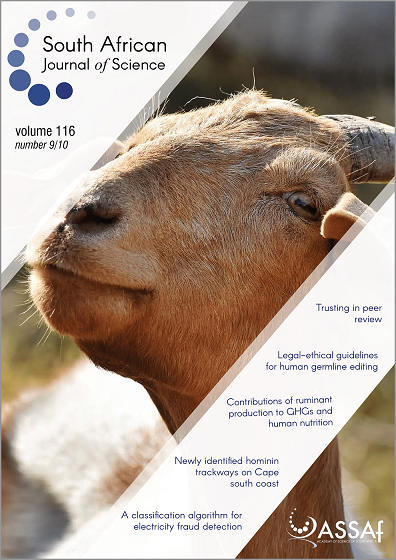Human germline editing: Legal-ethical guidelines for South Africa
DOI:
https://doi.org/10.17159/sajs.2020/6760Keywords:
genome editing, gene editing, CRISPR-Cas9, prospective person, health-care access, scientific freedom, assisted reproductionAbstract
Human germline editing holds much promise for improving people’s lives, but at the same time this novel biotechnology raises ethical and legal questions. The South African ethics regulatory environment is problematic, as it prohibits all research on, and the clinical application of, human germline editing. By contrast, the South African legal regulatory environment allows a regulatory path that would, in principle, permit research on human germline editing. However, the legal regulation of the clinical application of human germline editing is uncertain. As such, the current ethical and legal positions in South Africa are in need of reform. Five guiding principles – aligned with the values of the Constitution – are proposed to guide ethical and legal policy reform regarding human germline editing in South Africa: (1) Given its potential to improve the lives of the people of South Africa, human germline editing should be regulated, not banned. (2) Human germline editing clinical applications should only be made accessible to the public if they are proven to be safe and effective. (3) Non-therapeutic human germline editing may be permissible, and should be regulated in the same way as therapeutic human germline editing. (4) The decision on whether to use germline gene editing on a prospective child, should, subject to Principle 2, be left to the prospective parents. (5) Concerns about exacerbating social inequalities should be addressed by measures to increase access. In conclusion, recommendations are made to policymakers and scientists contemplating research in this field.
Significance:
- The ethical and legal positions regarding human germline editing in South Africa are comprehensively analysed. Furthermore, five guiding principles – aligned with the values of the Constitution – are proposed to guide much needed ethical and legal policy reform regarding human germline editing in South Africa.
Published
Issue
Section
License

All articles are published under a Creative Commons Attribution 4.0 International Licence
Copyright is retained by the authors. Readers are welcome to reproduce, share and adapt the content without permission provided the source is attributed.
Disclaimer: The publisher and editors accept no responsibility for statements made by the authors
How to Cite
- Abstract 3064
- PDF 1907
- EPUB 216
- XML 386
Funding data
-
Inyuvesi Yakwazulu-Natali
-
National Research Foundation
Grant numbers 116275












.png)